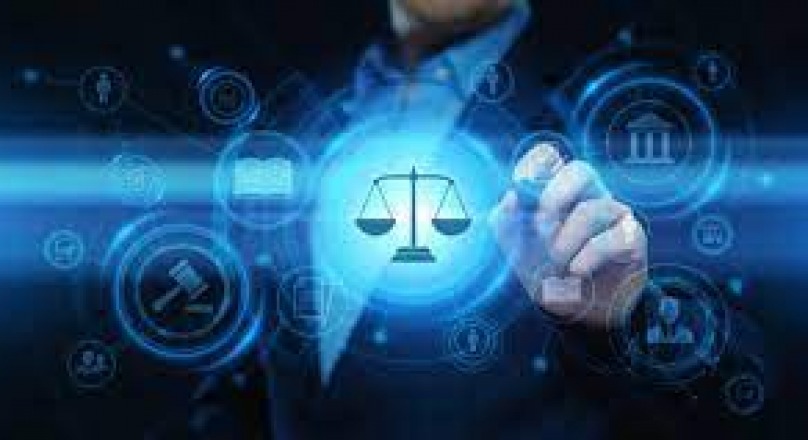AI in Law: Revolutionizing Legal Practice and Jurisprudence

AI in Law: Artificial intelligence (AI) is becoming a major factor in many different areas, including law. In this article, we will discuss the ways in which artificial intelligence (AI) improves legal research, changes the way contracts are managed, affects the creation and evaluation of legal documents, assists with e-discovery and case evaluation, and even transforms courtrooms. Come explore with us how AI could change the legal landscape.
AI in Law: Understanding the Role of Artificial Intelligence in Law
The goal of the computer science field of artificial intelligence (AI) is to build machines that are capable of tasks that ordinarily call for human intelligence. It is used in the legal field to assist legal professionals with a range of duties, including as legal research, contract management, case appraisal, and document analysis. Using AI, legal teams may get insightful information, save time, and boost accuracy.
AI in Law: Historical Background of Customary Legal Procedures and AI Integration
In the past, legal professionals collected and analyzed legal data manually. Going through legal documents and textbooks takes hours. However, the application of AI has significantly simplified this time-consuming process.
Legal practitioners may now access vast databases of legal material using AI-powered tools, which allow them to swiftly search, filter, and retrieve relevant laws, cases, and regulations. The swift progression of technology has revolutionized the study and analysis of law, driving the growth of jurisprudence.
Examining the Consequences and Difficulties of Artificial Intelligence in Jurisprudence
Although artificial intelligence (AI) has a lot to offer the legal industry, there are also a lot of consequences and difficulties. For example, the use of AI systems necessitates a careful assessment of their precision and dependability. It’s also critical to guarantee openness and deal with biases in AI algorithms.
Furthermore, professional training and ethical frameworks must alter in order for AI to be used in the legal industry. To preserve the integrity of the legal system, legal practitioners must comprehend and negotiate the ethical issues surrounding the use of artificial intelligence.
Enhancing Legal Research and Analysis through AI
• Automated Legal Research: Enhancing Precision and Reducing Time: AI-powered platforms can assist legal practitioners in automating legal research processes. These platforms swiftly obtain relevant facts by scanning vast legal libraries with machine learning and natural language processing algorithms. By saving time, legal scholars can focus on higher-value projects and boost output and client service.
• AI-Powered Data Analysis: Revealing Trends and Perspectives: Attorneys may discover trends and insights through the application of AI in legal analysis that they might not have seen otherwise. Using advanced analytics technology, lawyers may analyze vast amounts of data, identify trends, and make decisions based on facts. This makes it possible for lawyers to build stronger cases and develop successful litigation strategies.
• Lawyers’ Aid in Case Evaluation using Predictive Analytics: One notable additional application of AI in the legal sector is predictive analytics. By looking at case data from the past, AI systems can predict the potential outcomes of cases that are currently pending compared to those that are not. This aids in risk assessment, strategy formulation, and client counselling for lawyers. Predictive analytics combined with legal expertise gives legal practitioners a competitive edge.
Maintaining compliance is a crucial aspect of contract management. AI-powered monitoring and audit tools assist legal teams in tracking compliance with contractual obligations and changing regulations. These tools automate the monitoring process, flag potential non-compliance issues, and provide suggestions for corrective actions. This proactive approach strengthens risk management and reduces legal liability.
AI’s Effect on the Drafting and Analysis of Legal Documents
o Automated Drafting: By utilizing client data and pre-existing templates, AI-powered drafting solutions expedite the creation of legal documents. The uniformity and efficiency are increased by this automation.
o Language Analysis and Document Comparison: By highlighting important clauses and possible problems, AI’s language analysis skills help to understand complicated legal documents. Tools for comparing documents make it easier to analyze different versions while maintaining correctness and consistency.
o Cutting Down on Mistakes and Acquiring Knowledge: Artificial intelligence-powered proofreading systems reduce mistakes by emphasizing consistency, grammar, and spelling mistakes. They also provide shrewd advice on how to increase accuracy and clarity.
AI’s Place in E-Discovery and Case Evaluation
o Effective Data Management: Artificial Intelligence makes e-discovery easier by automating the classification and sorting of data, assisting legal practitioners in effectively managing vast amounts of electronic evidence.
o Automated Document Review: AI-powered solutions streamline the review process by classifying and evaluating documents based on relevancy, freeing up lawyers to concentrate on making strategic decisions.
o Advanced Case Assessment: By forecasting outcomes and guiding litigation strategies, AI’s predictive analysis capabilities support case assessment by improving decision-making and client advise.
Smart Courtrooms and Artificial Intelligence
o Virtual Hearings and Online Dispute settlement: Artificial Intelligence (AI) facilitates safe data management, smooth communication, and remote participation and effective case settlement through virtual hearings and online dispute resolution platforms.
o Automation of Robotic Processes (RPA) for Administrative Tasks: Automating routine administrative operations in courtrooms with AI-powered RPA lowers human error, speeds up procedures, and boosts productivity.
o Ethical and Transparent AI Application: Regular audits, open decision-making procedures, and continuous algorithm review are essential to guaranteeing the ethical application of AI in courtrooms. These actions preserve justice, protect the public’s trust, and lessen prejudice.
Summary and Conclusion
The legal profession has undergone a transformation with the incorporation of AI into legal proceedings and jurisprudence. Artificial Intelligence (AI) enriches legal research, elevates the drafting and analysis of legal documents, eases e-discovery and case evaluation, and even revolutionizes the courtroom. Achieving a balance between the ethical issues raised by AI and the opportunities it brings is crucial as we move forward. The law has a great deal of room to expand and innovate in the future if it embraces AI while maintaining moral principles.

Know about the Author
Author Name: Meenu Singh
Profession: Young Professional at AICTE (All India Council for Technical Education)
Meenu Singh is a highly skilled professional with a strong background in administration and human resources. She holds a Post Graduate Diploma in Human Resource Management from IGNOU and an MBA in HR from Guru Gobind Singh Indraprastha University. Recognized as a certified POSH Trainer by the Indian Society for Training & Development, Meenu brings a wealth of experience to her role. Previously, she served as an Apprentice Human Resource Executive Trainee at Power Grid Corporation of India Limited, where she gained valuable insights and expertise in the field.


